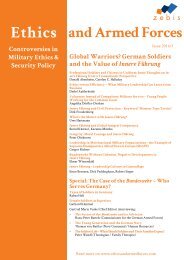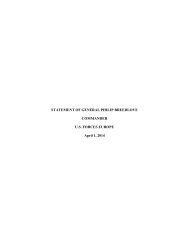FULLTEXT01
FULLTEXT01
FULLTEXT01
You also want an ePaper? Increase the reach of your titles
YUMPU automatically turns print PDFs into web optimized ePapers that Google loves.
TACTICAL THOUGHT<br />
2014 September 29 th<br />
- The link between culture and religion is needed to be more emphasized in officer<br />
education. It is important in Irregular Warfare.<br />
Result summary; the answers resulted in 14 response groups where two dominate.<br />
These two are related to the areas of "Tactics in general" (11 standpoints) and<br />
"Education / training" (9 standpoints). Several other areas were addressed, all however,<br />
to a limited extent. These areas were Capabilities (1), Politics / strategy (3), Violence<br />
areas (1), Organization / division (3), Personnel skills (3), Unit activities (2),<br />
Management / leadership (4), Civil interaction (1), Experiences (1) Other comments (3).<br />
In general, regarding the area of tactics, a deeper and more analysed and reflected view<br />
and discussion, from the unique Swedish perspective was addressed as being needed. In<br />
the area of "Education / training", development efforts were addressed for all levels,<br />
particularly highlighting the importance of extensive practice based on deep analysis of<br />
lessons learned and experienced trainers.<br />
Summary of the answers to the open-ended question<br />
Question 6; “What does the concept of tactics mean to you” resulted in two major<br />
areas of thinking. The first and dominant group (20 answers) describes a view of tactics<br />
that can be generalized as; ”the use (or manoeuvre with, or coordination of, or<br />
adaption) of units or resources to reach a specific goal”. In this category several<br />
different articulations can be found. The other group (15 answers) contains aspects not<br />
directly related to the overarching description such as; ” use of units for a certain goal”,<br />
but as a way of thinking in general. These two views can be summarized with; “to use<br />
practically” and; “to think about how to use” (units) or generalized as one practical and<br />
one theoretical view.<br />
Regarding question 7; views of one’s own thinking on the subject of tactics, three<br />
categories can be generalized. Twenty-four officers, who are about half the total sample,<br />
state a rather traditional way of thinking, mainly influenced by Regular Warfare<br />
thinking. The two other categories can be described as containing a more generic and<br />
wider analytical approach, as a more direct Irregular Warfare tactics perspective.<br />
Generalized it can be said that a more direct Regular Warfare perspective is common,<br />
whether as a wider generic approach or a more direct Irregular Warfare approach.<br />
Question 13; “Do you often discuss tactics with your colleagues and commanding<br />
officers” resulted in 38 replies (of 43 possible) distributed mainly over two larger<br />
groups of 15 statements each. The "Yes group” contained one mechanized battalion<br />
commanding officer and one amphibious rifle company commanding officer, saying<br />
they often discussed tactics with subordinates, but not with their senior commanders.<br />
This group also included one armoured company commanding officer and one<br />
amphibious battalion commanding officer; contradictably saying that they discussed<br />
tactics mainly with the senior commanders. The "No group” contained 15 statements of<br />
which two said that they discussed tactics during international missions.<br />
14





